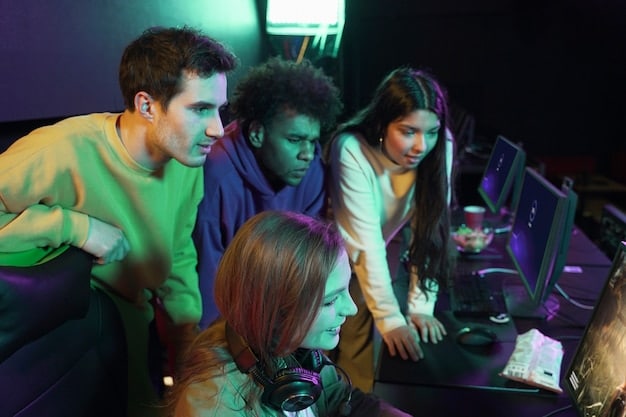Gen Z’s Gaming Habits: 5 Esports & Streaming Trends

Gen Z’s engagement with gaming extends beyond mere pastime, reshaping the landscapes of Esports and live streaming into vibrant cultural ecosystems that redefine entertainment and social interaction.
The digital age has profoundly transformed how generations engage with entertainment, and for Gen Z, gaming stands at the forefront of this evolution. Far from being a niche hobby, understanding Gen Z’s Gaming Habits: 5 Emerging Trends in the World of Esports and Streaming is crucial to grasping their social, cultural, and even economic realities.
The transformative power of community in Gen Z gaming
Gen Z’s approach to gaming is profoundly communal, moving beyond individual play to embrace shared experiences. This generation seeks connection and belonging, finding it abundantly within the dynamic spaces of online multiplayer games and vibrant streaming platforms. It’s a fundamental shift from previous generations, where gaming was often a solitary pursuit.
From solitary play to social hubs
Gaming for Gen Z often transcends the boundaries of the digital realm, spilling into real-world friendships and fostering a sense of shared identity. Online games serve as virtual community centers where players collaborate, compete, and simply hang out, making new connections that might last a lifetime. These virtual hangouts are as significant as physical ones, providing platforms for self-expression and belonging. The move towards massively multiplayer online games (MMOs) and collaborative titles speaks volumes about this preference.
- Shared experiences: Gen Z values playing games with friends, even if those friends are miles away.
- Social identity: Gaming communities offer spaces for self-expression and forming online personas.
- Skill sharing: Players learn from each other, fostering a collaborative skill development environment.
- Belonging: For many, gaming offers a sense of inclusion not always found offline.
This communal aspect is not confined to gameplay but extends into the burgeoning worlds of Esports and live streaming, where collective viewing and participation amplify the social dynamic. The spectator experience, once passive, has become interactive, driven by chat functions, emotes, and direct engagement with streamers.
Furthermore, the rise of “social games” and platforms that prioritize interaction over competition highlights this trend. These games, often free-to-play, thrive on user-generated content and shared creative endeavors, strengthening bonds between players. The platforms themselves are designed to facilitate communication, enabling seamless voice chat, private messaging, and group creation features.
The rise of shared virtual spaces
More than just games, these platforms are becoming virtual meeting points, often referred to as metaverses, where social interaction is the primary objective. Events, concerts, and even educational experiences are now being hosted within these digital environments, attracting millions of Gen Z participants. The allure lies in the immersive and interactive nature of these spaces, allowing for experiences that traditional social media cannot offer. The lines between gaming and social networking continue to blur, making these virtual worlds integral to Gen Z’s social fabric.
This blend of gaming and social networking platforms represents a new frontier for digital interaction. It allows for a more immersive and engaging form of communication, which resonates deeply with a generation that has grown up with constant digital connectivity. The concept of “hanging out” has evolved to include these virtual spaces, making them as legitimate a form of social interaction as any physical gathering. It’s a testament to how profoundly gaming has permeated Gen Z’s daily lives and social routines, redefining what it means to connect.
Esports as mainstream entertainment: beyond niche appeal
Esports has shed its niche status, transforming into a global entertainment phenomenon that rivals traditional sports. For Gen Z, watching professional gamers compete is as engaging, if not more so, than watching traditional athletic events. This shift is driven by accessibility, aspirational narratives, and the innate digital fluency of the younger generation.
Accessibility and aspirational narratives
Unlike traditional sports which often require physical presence or expensive subscriptions, Esports is largely accessible online, often free to watch on platforms like Twitch and YouTube. This low barrier to entry, coupled with the aspirational stories of young players rising to stardom, resonates deeply with Gen Z. They see themselves in these players, understanding the dedication and skill involved, making the journey feel more relatable and inspiring. The narrative arc of an underdog team or player making it big is particularly compelling, mirroring stories that have long been popular in mainstream media.
The interactive nature of watching Esports also plays a significant role. Viewers can chat with fellow fans, react in real-time, and even influence the broadcast through polls or donations, creating a dynamic and engaging experience far removed from passive television viewing. This level of participation fosters a stronger sense of community and investment in the outcome of matches. The ability to switch between multiple streams, follow specific players, or even watch replays on demand further enhances the viewing experience, catering to individual preferences.
The competitive drive and professional pathways
The professionalization of Esports has created legitimate career paths, from players and coaches to casters and analysts. This presents a tangible future for passionate gamers, moving beyond the stereotype of gaming as a wasteful pastime. Gen Z, often characterized by its pragmatic view on careers and finances, finds the potential for a stable and exciting future in Esports very attractive. The growth of collegiate Esports programs and scholarships further legitimizes the field, providing structured pathways for aspiring professionals.
The structured nature of tournaments, complete with elaborate stages, live audiences, and significant prize pools, elevates Esports to the level of major sporting events. These productions are often visually stunning, employing cutting-edge technology to enhance the viewing experience, including real-time statistics and player cameras. This level of production quality helps to draw in a wider audience, demonstrating the seriousness and scale of the Esports industry.
Moreover, the competitive element of Esports taps into a universal human desire for achievement and recognition. Gen Z, growing up in a highly competitive digital landscape, thrives on challenges and the pursuit of mastery. Esports offers a clear arena for this, where skill, strategy, and quick thinking are paramount. The ability to witness peak performance and rapid innovation in real-time keeps audiences captivated and eager for the next big play.
Live streaming as the new social media for Gen Z
For Gen Z, live streaming platforms like Twitch and YouTube Live have supplanted traditional social media as primary sites for social interaction and entertainment. These platforms offer an authentic, unfiltered, and deeply interactive experience that resonates more deeply than curated posts or short-form videos. It’s a space where content creators and viewers interact in real-time, blurring the lines between audience and participant.
Authenticity over curation
Gen Z values authenticity above all else. Live streaming, by its very nature, is spontaneous and unscripted, providing a raw and genuine connection with creators. This contrasts sharply with the often-perfected and artificial personas seen on other social media platforms. Streamers offer a window into their daily lives, their passions, and their struggles, fostering a sense of relatability and trust that is hard to build through edited content. This genuine connection strengthens the bond between streamers and their audience, cultivating loyalty.
The transparency inherent in live streaming also contributes to its appeal. Viewers can witness reactions and conversations as they unfold, making the experience feel more immediate and less manipulated. This directness is a significant draw for a generation wary of traditional media and sponsored content. The ability to see unfiltered moments creates a powerful sense of intimacy and shared experience, reinforcing authenticity.
Interactive entertainment and parasocial relationships
The interactive features of live streaming – live chat, polls, subscriptions, and donations – create a dynamic feedback loop between streamers and their audience. This interaction fosters strong parasocial relationships, where viewers feel a personal connection to the creators they follow. These relationships are not one-sided; streamers often respond directly to chat messages, remember regular viewers, and build a community around their content, making viewers feel seen and valued. This active participation elevates the viewing experience from passive consumption to active engagement.
- Real-time chat: Viewers can communicate directly with streamers and other viewers.
- Subscribing and donating: Directly support streamers, often gaining exclusive perks.
- Community building: Streamers often host events or Discord servers for their communities.
- Diverse content: Beyond gaming, live streams include art, music, cooking, and academic study sessions.
This level of engagement transforms the traditional media consumption model, creating a vibrant, participatory culture. For Gen Z, it’s not just about watching; it’s about being part of something larger. The sense of belonging within a streamer’s community can be very significant, providing a source of connection and shared interest. The ability to influence the content being created, even if subtly, also gives viewers a sense of agency, making them feel like active contributors rather than mere spectators.
Gaming as a creative and economic avenue
Beyond entertainment and social connection, gaming has emerged as a significant avenue for creativity and economic opportunity for Gen Z. This generation is not merely consuming content but actively producing it, transforming their passion into profitable ventures and innovative expressions. The accessibility of creation tools and distribution platforms has democratized content creation, making it possible for anyone to become a creator.
Content creation and personal branding
The desire to create is strong within Gen Z, and gaming provides a rich sandbox for this creativity. From streaming their gameplay and commentary to editing highlights for platforms like YouTube and TikTok, Gen Z gamers are building personal brands and cultivating unique audiences. This pursuit of content creation often begins as a hobby but can quickly evolve into a full-time profession, demonstrating the entrepreneurial spirit of this generation. The visual nature of gaming lends itself well to short-form, highly engaging content, perfect for platforms like TikTok.
The skills learned through gaming content creation, such as video editing, graphic design, social media management, and public speaking, are highly transferable and valuable in the modern job market. This practical application of digital literacy skills further illustrates how gaming is preparing Gen Z for future careers that may not even exist yet. The ability to pivot between different platforms and content formats also highlights their adaptability and willingness to experiment.
Monetization and entrepreneurial spirit
The gaming ecosystem offers numerous avenues for financial gain, from ad revenue on streaming platforms and sponsorship deals to selling merchandise and developing indie games. Gen Z, having grown up in a digital-first economy, is adept at navigating these opportunities, often leveraging multiple income streams. This entrepreneurial mindset, fostered by the democratic nature of online platforms, allows them to turn their passion into a viable career. The direct connection with their audience means they can build sustainable businesses through community support.
- Ad revenue and sponsorships: Major income streams for popular streamers and content creators.
- Merchandise sales: Opportunity to brand and sell products directly to fan bases.
- Game development: Indie developers creating and monetizing their own games.
- Esports winnings: Professional players competing for significant prize pools.
This economic dimension not only empowers individual Gen Z creators but also drives innovation within the gaming industry. As creators demand better tools and features, platforms are compelled to evolve, leading to a dynamic and self-sustaining ecosystem. The ability to be financially independent through gaming-related activities is a powerful draw, offering a path that deviates significantly from traditional career trajectories. It encourages a new form of digital entrepreneurship, where passion and skill can directly translate into economic success.
Gaming for mental well-being and stress relief
In an increasingly demanding and interconnected world, Gen Z often faces significant pressures, both academic and social. Gaming frequently serves as a crucial outlet for mental well-being, offering a digital escape, stress relief, and a unique platform for cognitive engagement. Rather than solely being a source of distraction, gaming can be a structured and therapeutic activity that contributes positively to psychological health.
A digital sanctuary for relaxation
For many Gen Z individuals, gaming provides a sanctuary from the complexities of daily life. Immersive virtual worlds offer a controlled environment where they can decompress and engage in activities that are purely for enjoyment. This escapism is not about avoiding reality but rather about providing a necessary mental break, allowing for a recharge that can improve focus and mood in other aspects of life. The ability to momentarily step away from real-world anxieties can be incredibly beneficial.
Games offer varying levels of engagement, from casual puzzle games that promote relaxation to open-world adventures that allow for exploration and freedom without real-world consequences. This variety ensures that there is a gaming experience suitable for virtually any mood or need, contributing to its effectiveness as a stress-reduction tool. The predictable rules and clear objectives within games can also provide a sense of control and accomplishment often lacking in chaotic real-world scenarios.
Cognitive benefits and stress management
Beyond simple relaxation, gaming can actively contribute to cognitive function and emotional regulation. Many games require strategic thinking, problem-solving, and quick decision-making, which can enhance executive functions. For some, the focused engagement required during gameplay can also serve as a form of mindfulness, directing attention away from ruminative thoughts and towards the immediate task at hand, thus reducing anxiety.
- Problem-solving skills: Tackling in-game challenges improves critical thinking.
- Stress reduction: Engaging in enjoyable activities releases endorphins, reducing stress.
- Improved focus: Sustained attention during gameplay can translate to other tasks.
- Emotional outlet: Competitive or expressive games allow for healthy emotional release.
Furthermore, the social aspect of gaming, as discussed earlier, directly contributes to mental well-being by fostering connections and reducing feelings of isolation. Playing with friends or participating in online communities can provide a strong support network, allowing individuals to share experiences, celebrate successes, and commiserate over challenges in a low-pressure environment. This sense of belonging is a powerful antidote to loneliness, which can significantly impact mental health.
The narratives within games can also offer a safe space to explore complex emotions or difficult scenarios, providing a creative outlet for processing experiences. This can be particularly true for story-driven games that present moral dilemmas or character development arcs. Engaging with these narratives can provide a sense of empathy and perspective, allowing players to reflect on their own lives indirectly. Ultimately, gaming stands as a versatile tool for Gen Z to manage stress, enhance cognitive abilities, and foster overall mental resilience.
| Key Trend | Brief Description |
|---|---|
| 🎮 Community-Driven Gaming | Gaming is increasingly social, with Gen Z using games as virtual hangouts to connect and build communities. |
| 🏆 Esports Mainstream Appeal | Esports is a major entertainment form, offering accessible viewing and legitimate career paths for gamers. |
| 🎥 Live Streaming Domination | Live streaming is Gen Z’s preferred social media, valuing authenticity and direct creator-viewer interaction. |
| 💡 Creative & Economic Avenues | Gaming fosters creativity, offering numerous monetization opportunities for content creators and indie developers. |
Frequently Asked Questions About Gen Z Gaming
For Gen Z, games often function as virtual social spaces, much like traditional social media. They use multiplayer games and platforms to connect with friends, make new connections, and foster a sense of belonging in a digital community. The interactive nature of online gaming facilitates collaboration and shared experiences, which are highly valued.
Gen Z’s digital native upbringing and their preference for accessible, live content have significantly fueled Esports’ growth. They actively participate as viewers, aspiring players, and content creators, engaging with the competitive narratives and relatable professional gamers. This broad engagement has pushed Esports into the mainstream, garnering widespread attention and investment.
Live streaming offers Gen Z a more authentic and interactive experience. They value the unscripted nature of live content and the direct connection it provides with creators. Unlike curated social media posts, live streams foster genuine interactions and parasocial relationships, making viewers feel like part of a community rather than just spectators.
Absolutely. The gaming ecosystem has matured into a multi-billion dollar industry that provides diverse career paths. Beyond professional Esports players, Gen Z can pursue careers as streamers, content creators, game developers, artists, casters, and analysts. The entrepreneurial nature of online platforms allows many to monetize their passion directly.
Gaming serves as a significant outlet for stress relief and mental well-being. It offers an escape from daily pressures, a space for creative expression, and opportunities for social connection which combat loneliness. Many games also enhance cognitive skills like problem-solving and focus, providing a healthy form of engagement and a sense of accomplishment.
Conclusion
Gen Z’s relationship with gaming is multifaceted, evolving far beyond simple entertainment into a fundamental aspect of their social, economic, and even psychological landscapes. The five emerging trends—the rise of community-driven experiences, the mainstreaming of Esports, the dominance of live streaming, gaming as a creative and economic avenue, and its role in mental well-being—underscore a profound shift in how this generation interacts with digital content. For businesses, educators, and parents, understanding these dynamics is not merely about tracking a trend; it’s about recognizing a foundational element of Gen Z’s emerging culture and preparing for a future shaped by their interactive, community-centric, and digitally entrepreneurial habits.

